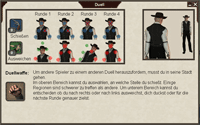Duelli: differenze tra le versioni
Nessun oggetto della modifica |
Nessun oggetto della modifica |
||
| Riga 20: | Riga 20: | ||
===Il duello=== | ===Il duello=== | ||
Un duello è composto da otto round. Ogni giocatore ha otto opportunità di effettuare e schivare colpi. Lo sfidante è colui che attacca, lo sfidato colui che si difende. | Un duello è composto da otto round. Ogni giocatore ha otto opportunità di effettuare e schivare colpi. Lo sfidante è colui che attacca, lo sfidato colui che si difende. Per infligere un colpo serve avere un buon valore di attacco. Per schivare un attacco serve avere un buon valore di difesa. | ||
===Valore di attacco=== | |||
[[File:Skill Aim.png|right]] | |||
[[File:Skill Appearance.png|right]] | |||
[[File:Skill Tactic.png|right]] | |||
The attack value is decided by your aiming skill. | |||
Either the attack value of the attacker or the attack value of the defender is lowered. With the skill 'tactics' the defender is able to use his home advantage. He chooses the side on which he stands and uses the knowledge of the town. The attacker uses his appearance to intimidate the defender. If the tactic skill of the defender is higher than the appearance skill of the attacker, the attackers attack value goes down. If it is lower, the attack value of the defender goes down. The bigger the difference between the skills, the more the attack value is lowered. | |||
Additionally each player receives a bonus of five for the attack value. | |||
===Dodging skill=== | |||
[[File:Skill Dodge.png|right]] | |||
The defense skill is decided by your dodging skill. | |||
Additionally each player receives a bonus of five for the dodging value. | |||
<br /> | |||
===Exchange of fire=== | |||
In every fight each of the fighters attacks eight times. Both fighters have eight chances to land a hit and to cause damage. The attacker is the first to attack. The fighters can use melee weapons or firearms. In the explanation below we explain the duel just based on firearms to make it less complicated. | |||
With each shot the attack value of the attacker is compared to the defense value of the defender. For this a random value is taken between one and the attack value, and a random value between one and the defense value. If the attack value is higher, the attacker lands a hit and causes damage. Is the value lower, the shot doesn't hit it's target and no damage is done. Now it's time for the current defender to attack. | |||
===Damage=== | |||
[[File:Skill Punch.png|right]] | |||
[[File:Skill Shot.png|right]] | |||
[[File:Skill Tough.png|right]] | |||
[[File:Skill Reflex.png|right]] | |||
Damage is causes when one player lands a hit, meaning, his attack value is higher than the defenders defense value. The amount of damage is decided by the attackers weapon. Every weapon has a minimal and maximal number for the damage it causes. Every time a hit is landed a random value somewhere between those numbers is taken. The defender loses the calculated amount of health points. | |||
There are two different dueling weapon classes. Melee weapons and firearms. The damage that is done with a melee weapon is increased by good vigor skills and it is mostly lowered by good toughness skills of the defender. For firearms the damage is increased by good shooting skills and lowered mostly by good reflexes of the defender. A player that has good vigor skills should therefore rather use a melee weapon than a firearm. | |||
<br /> | |||
===Striking zones=== | |||
[[File:Duel2.jpg|left]] | |||
You can set a dueling tactic by clicking on the menu 'Duel'. By setting the striking and dodging zones you can also alter the damage. | |||
Here you can set a few different things. For one you can set where you want to aim. Depending on the area you hit you make different amounts of damage. If you hit a shoulder you make 15% more damage. Hitting the head creates 50% more damage. | |||
<br /><br /> | |||
You can also set which way you are trying to dodge. If you dodge with the body part that the attacker was aiming at, your dodging skill gets doubled. | |||
*You can just duck down and by that protect the head and both shoulders. | |||
*You can duck to the left and protect your head, your right shoulder and your right arm. | |||
*You can duck to the right and protect your head, your left shoulder and your left arm. | |||
*You can choose not to try to dodge and have more concentration for the next round. This doubles your attack value. | |||
A duel lasts 8 rounds. The settings for round one are also used for round 5 and so on. | |||
===Winning a duel=== | |||
The player that causes more damage in the duel wins. If both players cause the exact same amount of damage, the defender wins. If a player loses all his health points in the duel, he passes out. In this case the other player is always the winner of the duel even if he caused less damage. | |||
==Dueling requirements== | |||
There are a few conditions for starting a duel. Some players may not challenge each other. | |||
*The defender has to be member of a town | |||
*The challenger has to be member of a town. This town also needs a mortician. | |||
*The challenger has to visit the town of the defender. The defender does not have to be in his town. | |||
*The challenger needs at least 12 energy points. | |||
*Both players have to be able to gain experience points from the duel. These are calculated from the dueling level. | |||
*You may not challenge the same player more than once per hour. | |||
*The defender may not have been knocked out within the last 48 hours. | |||
*The challenger may not have been knocked out within the last 48 hours. | |||
*The defender cannot be sleeping in a hotel. | |||
==Dueling reward== | |||
[[File:Duel3.png|right]] | |||
The winner of the a duel gets two rewards. | |||
The winner receives a part of the cash the defender was carrying around. If the defender doesn't carry any money, the winner doesn't receive anything. If the defender gets knocked out he loses all his cash. The winner still only gets some of it. | |||
The winner also receives experience points for the duel. How many points are received depends on the dueling level of the opponent. | |||
Experience = (7 * duelling level of loser) - (5 * duelling level of winner) + 5 | |||
The winner receives at least 5 experience points. | |||
===Dueling level=== | |||
The dueling level of a player is calculated from his character level and the experience points the player has earned in duels. The more points were received, the higher the dueling level | |||
===Motivation=== | |||
With each duel the motivation goes down by 3 points. A lower motivation means that less experience points and money are received. With a motivation of 50% the winner only receives half of the calculated points. It is always your own motivation that counts even if the defender wins. The motivation automatically goes up by 10 points per day. | |||
==Duels against NPCs== | |||
Duels against quest givers work the same way as other duels against players. There are however two major differences: | |||
*The Quest opponent does not take any money from you, even if you lose the duel. | |||
*You can challenge a quest opponent as often as you want, until you win the duel. There is no waiting time like with challenging other players. | |||
'''Careful:''' Even against a questgiver you can pass out and by that lose all of your money. | |||
Versione delle 06:19, 22 lug 2010
Duelli
Esistono due tipi di duelli: duelli tra giocatori e duelli contro NPC (Personaggi non umani generati dal sistema)
Duelli tra giocatori
Un duello è un combattimento tra due giocatori. Per effettuare un duello devi far parte di una città avente il becchino; a questo punto basta recarsi in una città straniera e cliccare nel saloon ottendo così una lista dei giocatori che si possono duellare o meno. Non tutti i giocatori possono essere sfidati, ecco alcuni esempi:
-Se lo sfidato sta dormendo non può essere sfidato -Se lo sfidato è svenuto non può essere duellato per 48h -Se lo sfidato è già stato duellato dal proprio personaggio si dovrà aspettare 1 ora prima di poterlo sfidare nuovamente
Ogni duello costa 12 punti energia.
Dal menù "duello" è possibile settare la propria strategia.
Il duello
Un duello è composto da otto round. Ogni giocatore ha otto opportunità di effettuare e schivare colpi. Lo sfidante è colui che attacca, lo sfidato colui che si difende. Per infligere un colpo serve avere un buon valore di attacco. Per schivare un attacco serve avere un buon valore di difesa.
Valore di attacco
The attack value is decided by your aiming skill.
Either the attack value of the attacker or the attack value of the defender is lowered. With the skill 'tactics' the defender is able to use his home advantage. He chooses the side on which he stands and uses the knowledge of the town. The attacker uses his appearance to intimidate the defender. If the tactic skill of the defender is higher than the appearance skill of the attacker, the attackers attack value goes down. If it is lower, the attack value of the defender goes down. The bigger the difference between the skills, the more the attack value is lowered.
Additionally each player receives a bonus of five for the attack value.
Dodging skill
The defense skill is decided by your dodging skill.
Additionally each player receives a bonus of five for the dodging value.
Exchange of fire
In every fight each of the fighters attacks eight times. Both fighters have eight chances to land a hit and to cause damage. The attacker is the first to attack. The fighters can use melee weapons or firearms. In the explanation below we explain the duel just based on firearms to make it less complicated.
With each shot the attack value of the attacker is compared to the defense value of the defender. For this a random value is taken between one and the attack value, and a random value between one and the defense value. If the attack value is higher, the attacker lands a hit and causes damage. Is the value lower, the shot doesn't hit it's target and no damage is done. Now it's time for the current defender to attack.
Damage
Damage is causes when one player lands a hit, meaning, his attack value is higher than the defenders defense value. The amount of damage is decided by the attackers weapon. Every weapon has a minimal and maximal number for the damage it causes. Every time a hit is landed a random value somewhere between those numbers is taken. The defender loses the calculated amount of health points.
There are two different dueling weapon classes. Melee weapons and firearms. The damage that is done with a melee weapon is increased by good vigor skills and it is mostly lowered by good toughness skills of the defender. For firearms the damage is increased by good shooting skills and lowered mostly by good reflexes of the defender. A player that has good vigor skills should therefore rather use a melee weapon than a firearm.
Striking zones
You can set a dueling tactic by clicking on the menu 'Duel'. By setting the striking and dodging zones you can also alter the damage.
Here you can set a few different things. For one you can set where you want to aim. Depending on the area you hit you make different amounts of damage. If you hit a shoulder you make 15% more damage. Hitting the head creates 50% more damage.
You can also set which way you are trying to dodge. If you dodge with the body part that the attacker was aiming at, your dodging skill gets doubled.
- You can just duck down and by that protect the head and both shoulders.
- You can duck to the left and protect your head, your right shoulder and your right arm.
- You can duck to the right and protect your head, your left shoulder and your left arm.
- You can choose not to try to dodge and have more concentration for the next round. This doubles your attack value.
A duel lasts 8 rounds. The settings for round one are also used for round 5 and so on.
Winning a duel
The player that causes more damage in the duel wins. If both players cause the exact same amount of damage, the defender wins. If a player loses all his health points in the duel, he passes out. In this case the other player is always the winner of the duel even if he caused less damage.
Dueling requirements
There are a few conditions for starting a duel. Some players may not challenge each other.
- The defender has to be member of a town
- The challenger has to be member of a town. This town also needs a mortician.
- The challenger has to visit the town of the defender. The defender does not have to be in his town.
- The challenger needs at least 12 energy points.
- Both players have to be able to gain experience points from the duel. These are calculated from the dueling level.
- You may not challenge the same player more than once per hour.
- The defender may not have been knocked out within the last 48 hours.
- The challenger may not have been knocked out within the last 48 hours.
- The defender cannot be sleeping in a hotel.
Dueling reward
The winner of the a duel gets two rewards.
The winner receives a part of the cash the defender was carrying around. If the defender doesn't carry any money, the winner doesn't receive anything. If the defender gets knocked out he loses all his cash. The winner still only gets some of it.
The winner also receives experience points for the duel. How many points are received depends on the dueling level of the opponent.
Experience = (7 * duelling level of loser) - (5 * duelling level of winner) + 5
The winner receives at least 5 experience points.
Dueling level
The dueling level of a player is calculated from his character level and the experience points the player has earned in duels. The more points were received, the higher the dueling level
Motivation
With each duel the motivation goes down by 3 points. A lower motivation means that less experience points and money are received. With a motivation of 50% the winner only receives half of the calculated points. It is always your own motivation that counts even if the defender wins. The motivation automatically goes up by 10 points per day.
Duels against NPCs
Duels against quest givers work the same way as other duels against players. There are however two major differences:
- The Quest opponent does not take any money from you, even if you lose the duel.
- You can challenge a quest opponent as often as you want, until you win the duel. There is no waiting time like with challenging other players.
Careful: Even against a questgiver you can pass out and by that lose all of your money.





















